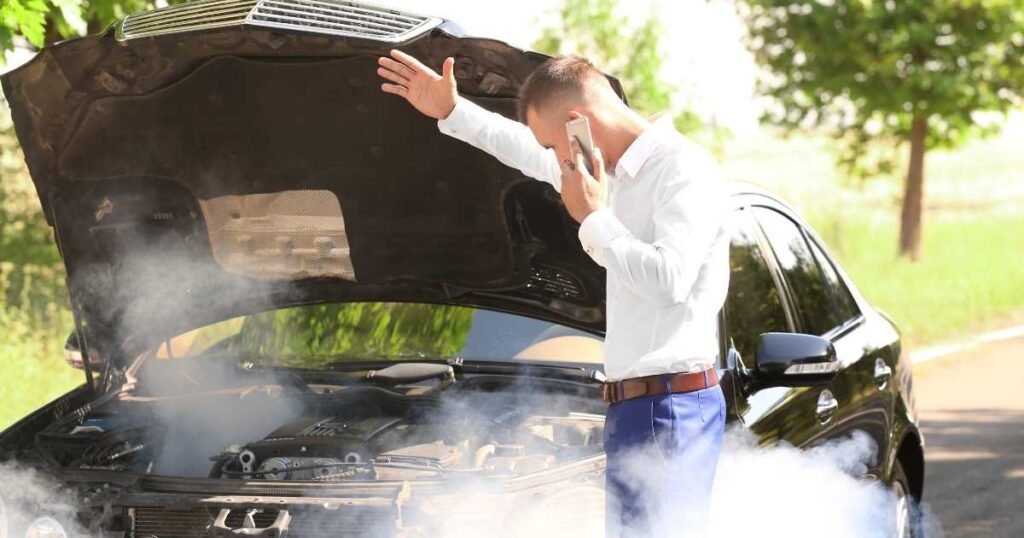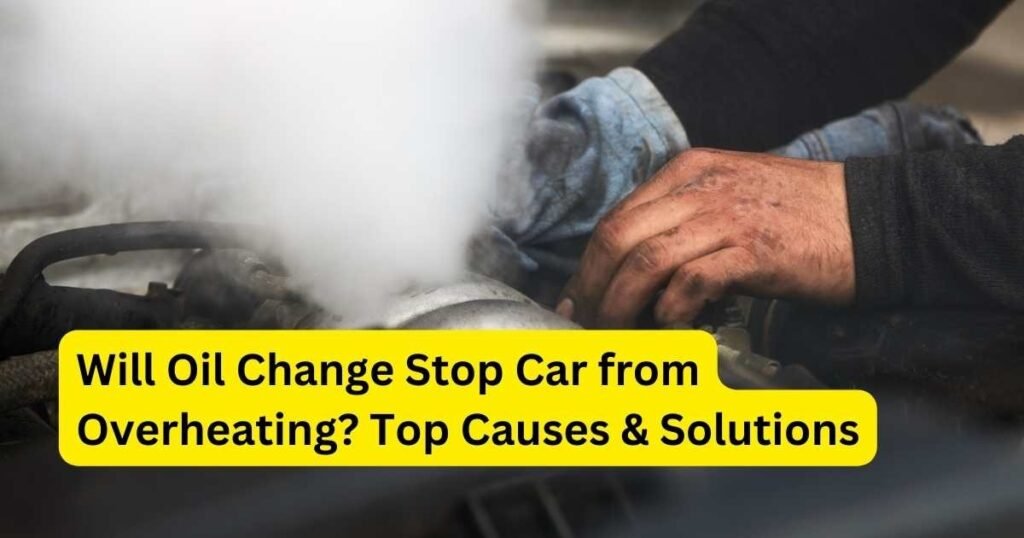As an automotive enthusiast with years of experience under the hood, I’ve encountered my fair share of car troubles. One common concern, especially during scorching summers, is engine overheating. It’s a nerve-wracking experience that can leave you stranded on the side of the road, watching your radiator emit billowing smoke.
Let’s delve into the truth about oil changes and their crucial role in maintaining a cool engine.
In this article:
Will Oil Change Stop Car from Overheating?
Yes, regular oil changes can significantly prevent your engine from overheating. Engine oil serves two critical functions: lubrication and heat dissipation. Fresh, clean oil minimizes friction between moving parts, reducing heat generation. It also absorbs and carries heat away from the engine block, transferring it to the radiator for cooling.
However, worn-out oil can’t perform these tasks effectively. It breaks down and thickens as oil ages, compromising its lubricating abilities. This increased friction creates excessive heat while the degraded oil struggles to carry heat away from the engine. This can lead to overheating, potentially causing severe engine damage.
What is the Role of Oil Changes for a Car?
Regular oil changes are like a refreshing drink for your car’s engine. Fresh engine oil lubricates the moving parts, reduces friction, and dissipates heat—it’s like giving your engine a cool, soothing bath. When oil becomes old and dirty, it loses effectiveness, increasing friction and heat buildup. So, remember to stick to your oil change schedule—it’s a small step that can make a big difference.
Why Does Engine Overheating Happen?
Engine overheating occurs when your car’s engine temperature rises to unsafe levels. If not addressed promptly, this can lead to severe damage. While a simple oil change may alleviate the issue, other factors contribute to overheating. Let’s explore these factors to understand better how to prevent them.
Why Does My Car Engine Overheat? Top Causes
Top Causes Behind Overheating While oil changes are essential, they’re not the sole solution. Here are other factors that contribute to engine overheating:
1. Thermostat Trouble
Your car’s thermostat is like a tiny gatekeeper that tells you when to let coolant flow. If it’s not working properly, your engine can get too hot. Listen for weird noises under the hood—they might tell you something’s wrong with the thermostat.
2. Radiator Hose Blockage
The hoses in your car help the coolant move around. If they get clogged, the engine can’t stay cool. It’s important to check these hoses and belts to ensure they’re all good.
3. Not Enough Coolant
Coolant is crucial for keeping the temperature just right. If there’s not enough, things can heat up fast. Look for puddles under your car—they might be coolant leaks.
4. Fan Problems
The fan helps air move through the radiator to cool things down. If it’s not working, your engine might overheat.
5. Water Pump Issues
The water pump is like the heart of the cooling system. It can’t do its job if it’s broken or dirty, and your engine might get too hot.
6. Leaks in the Cooling System
If there’s a leak, your car might lose coolant, and that’s not good for keeping things cool.
7. Low Oil Levels
Just like you need water, your engine needs oil. If there’s not enough oil, things can get hot and cause problems.

What are the Signs Your Engine Might Be Overheating Due to Oil Issues?
Overheating in vehicles can be caused by various factors. However, sure signs indicate that the overheating is related to oil issues.
One sign is a low oil level. If the oil volume in your vehicle is insufficient, it means there’s less lubrication and reduced capacity for heat absorption. It’s important to check your oil level regularly. This is a simple habit, but it’s crucial for maintaining your vehicle’s health.
Another sign is dirty oil. Over time, engine oil can accumulate contaminants and debris. After a specific interval, the oil becomes less effective at both lubricating the engine parts and dissipating heat.
In addition to these oil-related issues, you should be aware of other warning signs of overheating. These include a rising temperature gauge on your dashboard, steam coming out from under the hood, a burning odor, and reduced engine power. If you notice any of these signs, you must pull over to a safe location and turn off the engine. Avoid restarting it and call for roadside assistance.
What to Do If Your Car Overheats?
When driving and your car gets too hot, you might see the temperature gauge go to the red zone. You might also smell something weird or see steam coming out from under the hood. Acting fast so your car doesn’t get hurt is essential if this happens.
Here’s what you should do:
- Turn off your car’s engine and the air conditioner. This helps your vehicle start to cool down.
- Find a safe place to stop your car on the side of the road.
- Wait a bit before opening the hood because everything inside is super hot. Give it at least 15 minutes to cool off.
- Once it’s safe, check if you need more coolant, which helps keep your car cool. But remember, don’t add coolant if your vehicle is too hot.
- If your car is still not happy, it’s time to call for help. You can ring up a tow truck or ask a friend to come over.
These steps can help keep your car from getting too hot and ensure safety.
What can you avoid when your car is overheating?
When your car overheats, there are certain things you should avoid doing to prevent further damage.
Firstly, never add coolant to a hot engine. It’s important to wait until the engine has cooled down completely before adding coolant. The pressurized system can make adding coolant to an overheated engine dangerous.
Secondly, don’t continue driving if your engine is overheating. This can cause severe damage to your vehicle.
Lastly, try to fix the overheating issue yourself, but only if you’re a mechanic. Diagnosing and repairing the cause of overheating often requires a mechanic’s expertise.
What are the Simple Maintenance Solutions to Prevent Overheating?
Preventing your car from overheating is simpler than you might think. Here are some easy steps you can take:
Changing your car’s oil regularly is very important. Fresh oil helps reduce friction in the engine, which can get hot and cause problems if it’s not appropriately lubricated. Check your car’s manual to see how often you should change the oil.
The cooling system in your car is like its own little climate control. It includes things like the radiator and hoses that help keep the engine from getting too hot. If you’re worried about overheating, get a mechanic to check it out and tune it up.
While parking your car, try to find a shady spot. Sunlight can make your car hot inside, making the engine work harder to stay cool. You can use sunshades or crack the windows a bit to help keep it more relaxed.
If you use it correctly, your car’s air conditioning can help prevent overheating. Use the fresh air setting instead of recirculating air, especially when it’s really hot outside. When you start your car on a hot day, use the floor vents to get rid of the hot air faster.
Your car’s temperature gauge is like a little warning system for your engine. Pull over safely and turn off the engine if it starts creeping into the red zone or if any warning lights come on. Let it cool down before you try to start it again.
When your engine is cool, you can check the coolant level in the radiator. If it’s low, add more coolant and water following your car’s manual instructions. If the coolant looks dirty or weird, it might need to be flushed out and replaced.
Even though it’s not directly related to cooling, a weak battery can make your engine work harder and get hotter. When you visit the mechanics shop for an oil change, make sure to get your battery checked and replace it if it’s getting old. And don’t forget about other electrical parts like spark plugs—they need love, too!
Wrapping up
Regular oil changes prevent engine overheating & increase engine lifespan. Schedule your following oil change now to avoid costly repairs. Combining regular oil changes with a proactive maintenance approach can help keep your car running cool and avoid expensive repairs down the road.
Understanding why engines overheat and how to prevent it is crucial for your car’s engine’s long and healthy life. Following the tips mentioned earlier, you can keep your car cool and avoid the hassle of an overheated engine while on the road.


